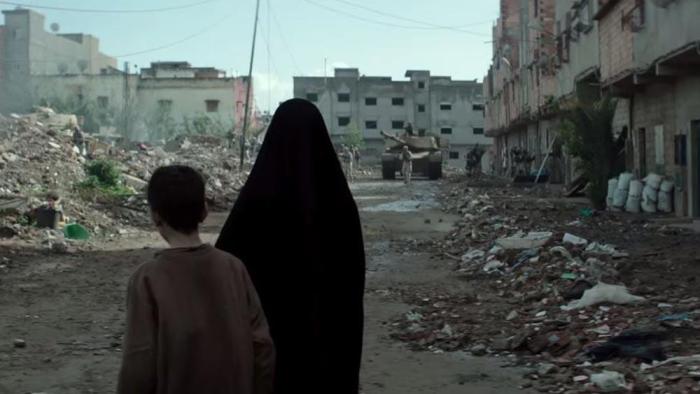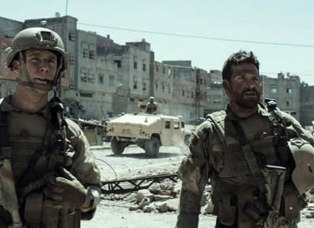
For anyone interested, there’s a wealth of reporting and commentary on Clint Eastwood’s latest and widely celebrated film American Sniper. Responses to the war drama range from effusive praise of the “genius” of Chris Kyle to more critical condemnations of Kyle’s enthusiastic embrace of violence and the broader societal maladies that his behavior emblematized. While this discussion is definitely worth having, there is a risk that confining the conversation to the criminality or heroism of Kyle distracts from a larger issue, namely what the US bombing of Fallujah looked like from the perspective of Iraqis. After all, the setting for the many kills carried out by “The Legend”, Kyle’s wartime moniker, was this city in Iraq, also known as the City of Mosques. Unlike debate over whether or not Kyle’s actions were justified, there really isn’t much to speculate about in this regard as the deeds of the US military have been voluminously documented by some of the most respected investigative journalists and scholars of the “western” world.
Take for example the work of the unembedded journalist Dahr Jamail. In his book on the US occupation of Iraq Beyond the Green Zone: Dispatches from an Unembedded Journalist in Occupied Iraq he documents, in excruciating detail, the humiliating and devastating human toll that the Iraqi people were made to endure under the onslaught of US weaponry. He opens his chapter on the Second Battle of Fallujah, the assault in which Kyle took part, with a photograph of an exasperated Iraqi. Beneath the photo is a caption that reads “Fallujan refugees at a mosque on Baghdad University campus told of the white phosphorous, cluster bombs, and other weaponry used by the US military in their city. November 2004.”

And this wasn’t the only fact excised from the Hollywood version of the military assault. On the topic of Abu Musab al-Zarqawi, a person who was explicitly named in the film as a threat to US soldiers, Jamail observes “in the United States, most corporate media outlets were busy spreading the misinformation that Fallujah had fallen under the control of Jordanian terrorist Abu Musab al-Zarqawi.” Jamail went on to add “There was no available evidence that Zarqawi had ever set foot inside the city. It was amply evident that the resistance of the city was composed primarily of people from Fallujah itself.” Given this “amply evident” fact that the media ignored one would think that ten years after the implementation of this war crime a more intellectually honest portrait of the siege would prevail. Yet, in the film there’s a scene where this myth is repeated without a shred of skepticism or caution. Neither was there any attention paid to the fact that the US deliberately punished the Iraqi population by blocking access to vital medical aid or as Jamail notes “the humanitarian disaster in Fallujah worsened as the US military continued to refuse entry to Iraqi Red Crescent (IRC) convoys of relief supplies.” The pretext for the blockage was that aid was unnecessary since there were no civilians in the city, an absurd claim immediately debunked after “officials acknowledged that thirty thousand to fifty thousand residents remained in the city.”
Incidentally, it would be instructive to compare the response to this war crime carried out by the US military to a more recent war crime carried out by Syrian forces in their ongoing civil war. After it was discovered that Syrian forces were blocking Red Cross aid to rebel territory in Baba Amr the Australian based Sydney Morning Herald ran an article headlined Outrage as Syria Keeps Up Blockade on Red Cross. “Syria faced world condemnation as it continued to block the Red Cross from delivering desperately needed aid to the vanquished rebel stronghold of Baba Amr in the city of Homs.” No such outrage was perceptible when the US engaged in similar atrocities under comparably dire circumstances during the murderous bombardment of Fallujah. Instead, the moment was characterized by a severe climate of media repression which included an order circulated by a US-backed media commission that all news outlets “stick to the government line on the US-led offensive in Fallujah or face legal action.” Meanwhile, US forces escalated the assault by attacking and occupying the city’s hospital.
None of this made it into Eastwood’s film, which completely glosses over the fact that this was a vicious military assault on a civilian population in a brief scene where a soldier refers to the “military aged males” in the area who were out to kill US soldiers. A radically different picture is presented in Jamail’s text, where he concludes his chapter on Fallujah with a historical analogue that must, for understandable reasons, be filtered out of any commentary heralding the military assault as valorous and brave, predictable clichés that pass for informed analysis in establishment quarters:
“The second assault on Fallujah was a monument to brutality and atrocity made in the United States of America. Like the Spanish city of Guernica during the 1930s, and Grozny in the 1990s, Fallujah is a monument to excess and overkill.”
Empirical data gathered in the aftermath of the attack conformed to this assessment. “Iraqi medical personnel in Fallujah estimated that of all the bodies they had logged in their database, at least 60 percent were women and children.” If one considers the documentation of the “first medical teams” on the scene, who “collected more than 700 bodies”, the percentage of women and children killed stands at “nearly 80 percent.” Recall this was the second time the US attacked the civilian population of Fallujah, the first time being in April 2004. In the Spring attack an estimated 736 Iraqis were killed with “60 percent of those killed [being] women, children, and elderly.” The film’s omission of any reference to the first attack on Fallujah in April is quite significant as this attack helps to explain the historical context in which the Iraqi resistance developed.
The exclusion of this highly relevant information, as many of the film’s enthusiasts contend, was not intentional. Rather, critics are reading too much into a movie that was not intended to be “political” but a “case study” on the tormented soul of an American soldier. Perhaps this argument could be taken seriously if it were not for other creative flourishes, which call into question this apolitical stance. Are we to believe that it’s a mere coincidence that Eastwood erased many of the morally repugnant realities from Kyle’s life, much of it discussed in his autobiography, while at the same time concocting, out of pure imagination, demeaning and stereotypical caricatures of Iraqis (“The Butcher” never existed)? This is highly doubtful, just as it likely was not coincidental that he dispensed with historical context entirely in his failure to mention the April assault on Fallujah as a prelude to the November assault but somehow managed to imply, in an amazingly brazen propaganda move, that the terrorist attacks of September 11 had anything to do with the Iraq war. Furthermore, neither of these distortions (the dehumanization of Iraqis and the fallacious 9/11-Iraq linkage), were they excluded from the movie, would have undermined Eastwood’s argument that the film was primarily a “case study” of Kyle. In fact, a more historically accurate depiction of the events probably would have enhanced the film’s impact as a case study. So why the glaring misrepresentations of the historical record?
Presumably, these directorial decisions were made because it was not enough for Eastwood to revise the factual record. He had to invert it. Iraqis weren’t the victims in his portrayal. They were the aggressors. The US military wasn’t engaged in the “supreme crime” of “military aggression” in violation of every conceivable standard of international law. To borrow the language of Chris Kyle’s father, the US military invaded Iraq as “sheepdogs” with the objective to protect the world’s “sheep” from the Iraqi “wolves.” The gap between this jingoistic worldview and reality is vast and will likely grow without a concerted effort on the part of the American public to inform themselves about the war crimes that the US military committed, as a matter of policy, in the city of Fallujah. Outside the most chauvinistic of circles, condemning Chris Kyle is quite easy. It’s alot more difficult to indict the society that produced him and laid the ideological basis for his crimes.



